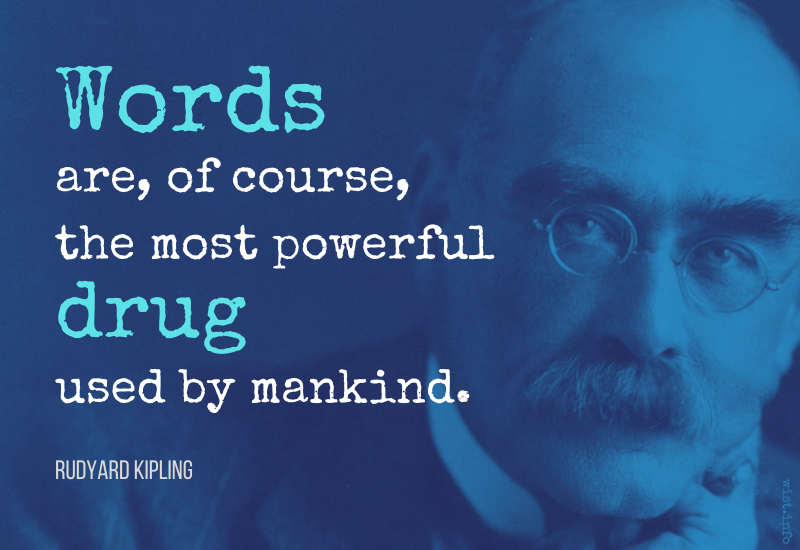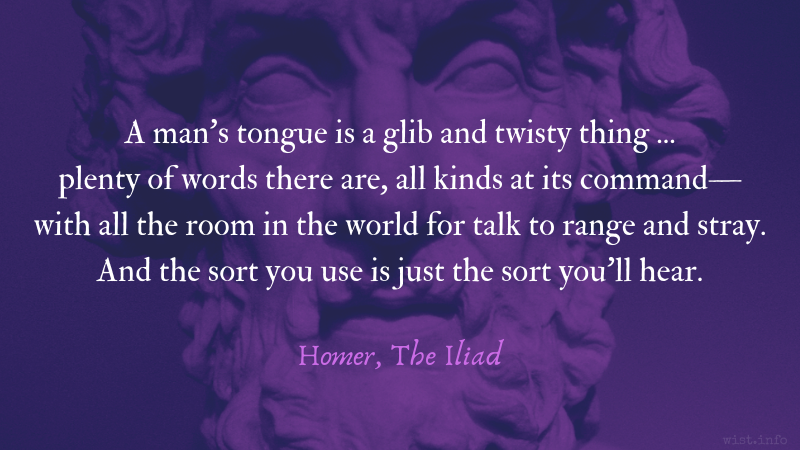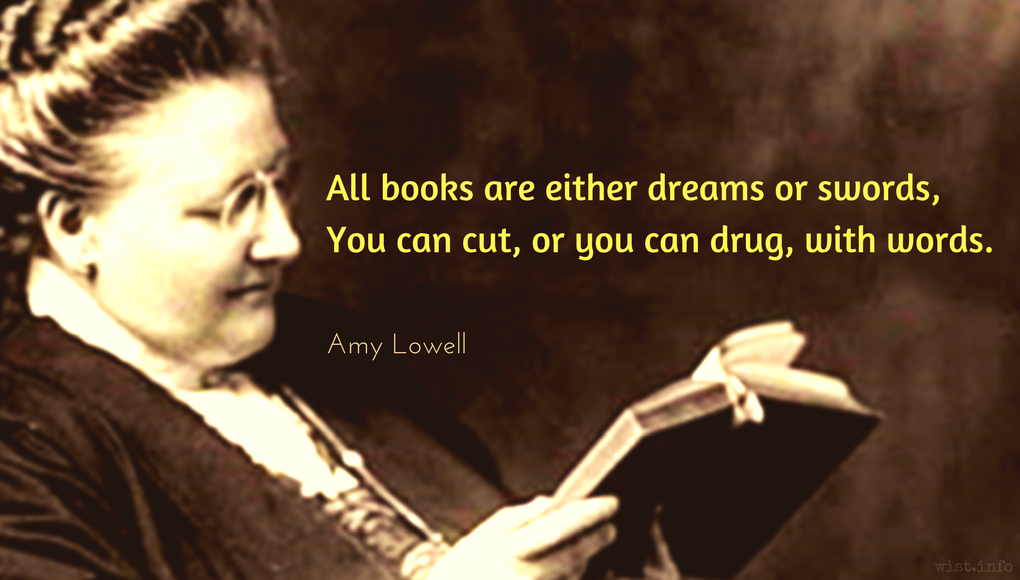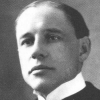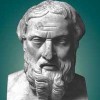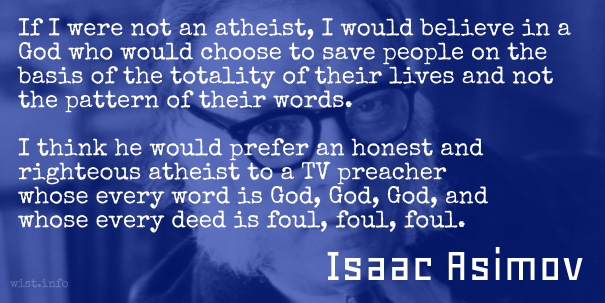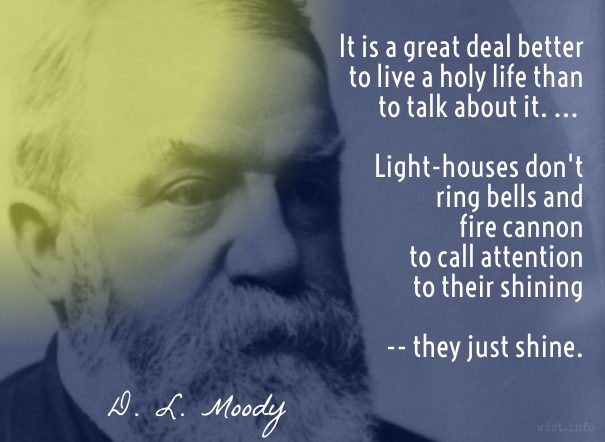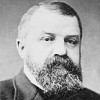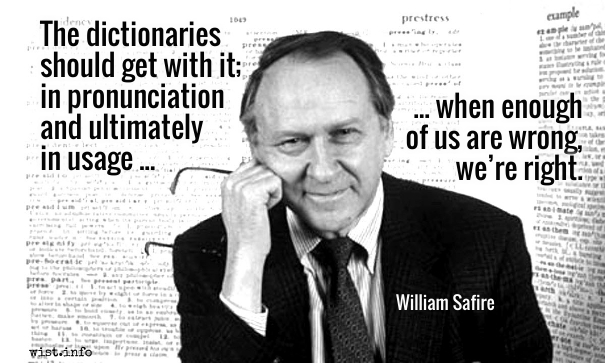The uses of a dictionary: at thirteen we look up lewd, licentious, lascivious; at thirty, febrile and inchoate; at fifty, endostosis.
Mignon McLaughlin (1913-1983) American journalist and author
The Neurotic’s Notebook, ch. 10 (1963)
(Source)
Quotations about:
words
Note not all quotations have been tagged, so Search may find additional quotes on this topic.
But words are things, and a small drop of ink,
Falling like dew, upon a thought, produces
That which makes thousands, perhaps millions, think.
Like a trained surgeon who is careful where he cuts, parents, too, need to become skilled in the use of words. Because words are like knives. They can inflict, if not physical, many painful emotional wounds.
Haim Ginott (1922-1973) Israeli-American school teacher, child psychologist, psychotherapist [b. Haim Ginzburg]
Between Parent and Child, Introduction (2003 ed.) [with A. Ginott and H. W. Goddard]
(Source)
All ways of expressing ourselves are good if they make us understood. Thus, if the clarity of our thoughts comes through better in a play of words, then the wordplay is good.
Joseph Joubert (1754-1824) French moralist, philosopher, essayist, poet
Pensées [Thoughts], 1805 (1850 ed.) [tr. Auster (1983)]
(Source)
Analog not found in standard translations of the Pensees.
Children learn what they experience. They are like wet cement. Any word that falls on them makes an impact.
Haim Ginott (1922-1973) Israeli-American school teacher, child psychologist, psychotherapist [b. Haim Ginzburg]
Between Parent and Child: Revised and Updated Edition, ch. 10 “Summing Up” (2003 ed.) [with A. Ginott and H. W. Goddard]
(Source)
Frequently paraphrased (e.g.) as "Children are like wet cement. Whatever falls on them makes an impression."
This is usually cited as being from the original 1965 edition of the book, but cannot be found there. Instead, it appears to be from the 2003 edition, as revised and updated by his wife, Dr Alice Ginott, and Dr H Wallace Goddard. It is unclear if Haim Ginott may have used this phrase in other contexts.
There is in the word, in the logos, something sacred which forbids us to gamble with it. To handle a language skillfully is to practice a kind of evocative sorcery.
[Il y a dans le mot, dans le verbe, quelque chose de sacré qui nous défend d’en faire un jeu de hasard. Manier savamment une langue, c’est pratiquer une espèce de sorcellerie évocatoire.]
Charles Baudelaire (1821-1867) French poet, essayist, art critic
L’Art Romantique, ch. 28 “Théophile Gautier,” sec. 3 (1868) [tr. Gilman (1958)]
(Source)
Originally published in L'Artiste (1859-03-13). It appears in Vol. 3, ch. 8 of the 1885 Œuvres complètes de Charles Baudelaire.
(Source (French)). Alternate translations:
There exists in the word, in the verb, something sacred which prohibits us from viewing it as a mere game of chance. To manipulate language with wisdom is to practice a kind of evocative sorcery.
[tr. Jakobson (1981)]
There is in a word, in a verb, something sacred which forbids us from using it recklessly. To handle a language cunningly is to practice a kind of evocative sorcery.
[E.g.]
And yet if there’s one thing consistent about language it is that it is constantly changing. The only languages that do not change are those whose speakers are dead.
Rosalie Maggio (1944-2021) American writer
Unspinning the Spin: The Women’s Media Center Guide to Fair and Accurate Language, “Writing Guidelines / Introduction” (2014)
(Source)
This is sometimes attributed to Maggio's earlier The Bias-Free Word Finder (1992), but only the first sentence is present in that version.
The source link is to the web page that the WMC set up for the book.
Sticks and stones may break my bones, but words will always hurt me. Bones mend and become actually stronger in the very place they were broken and where they have knitted up; mental wounds can grind and ooze for decades and be re-opened by the quietest whisper.
Stephen Fry (b. 1957) British actor, writer, comedian
Moab Is My Washpot, “Joining In,” ch. 4 (1997)
(Source)
My favorite word is “redemption.” I like both its meaning and the sound. My least favorite word is “maybe.” “Maybe” is almost always a “no” drawn out in cruel fashion.
Martha Elizabeth "Libba" Bray (b. 1964) American writer
“Twenty-One Things You Don’t Know About Me,” No. 4
(Source)
In her Amazon.com author biography.
These poor afflicted creatures spend their time with an ear against the speaker counting occurrences of the word bugger. If I had a large amount of money I should certainly found a hospital for those whose grip upon the world is so tenuous that they can be severely offended by words and phrases and yet remain all unoffended by the injustice, violence and oppression that howls daily about our ears.
Stephen Fry (b. 1957) British actor, writer, comedian
“Trefusis on Any Questions,” Loose Ends, BBC Radio 4 (c. 1987)
(Source)
Reprinted in Paperweight (1992).
Oh child, words well spoken might be false,
and with the beauty of words, might conquer truth;
yet this is not the surest test, that is character
and right; he who conquers with his fluency,
he is clever, but I hold facts mightier than words, always.[ὦ παῖ, γένοιντ᾽ἂν εὖ λελεγµένοι λόγοι
ψευδεῖς, ἐπῶν δὲ κάλλεσιν νικῷεν ἂν
τἀληθές· ἀλλ᾽οὐ τοῦτο τἀκριβέστατον,
ἀλλ᾽ἡ φύσις καὶ τοὐρθόν· ὃς δ᾽εὐγλωσσίᾳ
νικᾷ, σοφὸς µέν, ἀλλ᾽ἐγὼ τὰ πράγµατα
κρείσσω νοµίζω τῶν λόγων ἀεί ποτε.]Euripides (485?-406? BC) Greek tragic dramatist
Antiope [Αντιοπη], frag. 206 (Kannicht) [Antiope/ΑΝΤΙΟΠΗ?] (c. 410 BC) [tr. Will (2015)]
(Source)
(Source (Greek)). TGF frag. 205.
In all such oaths we are not to attend to the mere form of words, but the true design and intention of them.
[Semper autem in fide quid senseris, non quid dixeris, cogitandum.]
Marcus Tullius Cicero (106-43 BC) Roman orator, statesman, philosopher
De Officiis [On Duties; On Moral Duty; The Offices], Book 1, ch. 13 (1.13) / sec. 40 (44 BC) [tr. Cockman (1699)]
(Source)
(Source (Latin)). Alternate translations:
In obligations of faith, it is the meaning always, not the words that are to be considered.
[tr. McCartney (1798)]
In a promise, what you thought, and not what you said, is always to be considered.
[tr. Edmonds (1865)]
In a promise, what you mean, not what you say, is always to be taken into account.
[tr. Peabody (1883)]
A promise must be kept not merely in the letter, but in the spirit.
[ed. Harbottle (1906)]
In the matter of a promise one must always consider the meaning and not the mere words.
[tr. Miller (1913)]
You should always, in a matter of trust, think of what you mean, not of what you say.
[tr. Edinger (1974)]
We are all so clumsy, my dear, and words are all we have, poor signals like bonfires and flags trying to express what shipwreck is.
Rose Wilder Lane (1886-1968) American journalist, travel writer, novelist, political theorist
Letter to Dorothy Thompson (Jan 1927)
(Source)
In William Holtz, ed., Dorothy Thompson and Rose Wilder Lane: Forty Years of Friendship (1991)
I am, by calling, a dealer in words; and words are, of course, the most powerful drug used by mankind.
Rudyard Kipling (1865-1936) English writer
“Surgeons and the Soul,” speech, Royal College of Surgeons (14 Feb 1923)
(Source)
Words are more powerful than perhaps anyone suspects, and once deeply engraved in a child’s mind, they are not easily eradicated.
May Sarton (1912-1995) Belgian-American poet, novelist, memoirist [pen name of Eleanore Marie Sarton]
I Knew a Phoenix, “A Belgian School” (1959)
(Source)
The more articulate one is, the more dangerous words become.
May Sarton (1912-1995) Belgian-American poet, novelist, memoirist [pen name of Eleanore Marie Sarton]
Journal of a Solitude, “September 16th” (1973)
(Source)
Nothing we use or hear or touch can be expressed in words that equal what is given by the senses.
Hannah Arendt (1906-1975) German-American philosopher, political theorist
The Life of the Mind, Vol. 1 “Thinking,” Introduction (1977)
(Source)
Reprinted in "Thinking -- I" New Yorker (21 Nov 1977).
It might be argued that a man who employs this kind of skill with words for immoral purposes can do great harm, but the same goes for everything good except for virtue, and it goes above all for the most valuable things, such as strength, health, and generalship. After all, moral use of these things can do the greatest good, and immoral use the greatest harm.
[εἰ δ᾽ ὅτι μεγάλα βλάψειεν ἂν ὁ χρώμενος ἀδίκως τῇ τοιαύτῃ δυνάμει τῶν λόγων, τοῦτό γε κοινόν ἐστι κατὰ πάντων τῶν ἀγαθῶν πλὴν ἀρετῆς, καὶ μάλιστα κατὰ τῶν χρησιμωτάτων, οἷον ἰσχύος ὑγιείας πλούτου στρατηγίας: τούτοις γὰρ ἄν τις ὠφελήσειεν τὰ μέγιστα χρώμενος δικαίως καὶ βλάψειεν ἀδίκως.]
Aristotle (384-322 BC) Greek philosopher
Rhetoric [Ῥητορική; Ars Rhetorica], Book 1, ch. 1, sec. 13 (1.1.13) / 1355b (350 BC) [tr. Waterfield (2018)]
(Source)
(Source (Greek)). Alternate translations:
But if it be urged that a man, using such a power of words for an unjust purpose, would do much harm, this is common to all the goods, with the exception of virtue; and especially in the case of the most useful, as for instance strength, health, wealth, and command: for by the right use of these a man may do very much good, and by the wrong very much harm.
[Source (1847)]
If, however, any one should object that a person, unfairly availing himself of such powers of speaking, may be, in a very high degree, injurious; this is an objection which will like in some degree against every good indiscriminately, except virtue; and with especial force against those which are most advantageous, as strength, health, wealth, and generalship. Because employing these fairly, a person may be beneficial in points of the highest importance; and by employing them unfairly may be equally injurious.
[tr. Buckley (1850)]
If it is objected that the abuser of the rhetorical faculty can do great mischief, this, at any rate, applies to all good things except virtue, and especially to the most useful things, as strength, health, wealth, generalship. By the right use of these things a man may do the greatest good, and by the unjust use, the greatest mischief.
[tr. Jebb (1873)]
And if it be objected that one who uses such power of speech unjustly might do great harm, that is a charge which may be made in common against all good things except virtue, and above all against the things that are most useful, as strength, health, wealth, generalship. A man can confer the greatest of benefits by a right use of these, and inflict the greatest of injuries by using them wrongly.
[tr. Roberts (1924)]
If it is argued that one who makes an unfair use of such faculty of speech may do a great deal of harm, this objection applies equally to all good things except virtue, and above all to those things which are most useful, such as strength, health, wealth, generalship; for as these, rightly used, may be of the greatest benefit, so, wrongly used, they may do an equal amount of harm.
[tr. Freese (1926)]
And if someone using such a capacity for argument should do great harm, this at least, is common to all good things -- except virtue -- and especially so in the case of the most useful things, such as strength, health, wealth, and generalship. For someone using these things justly would perform the greatest benefits -- and unjustly, the greatest harm.
[tr. Bartlett (2019)]
It is absurd to hold that a man ought to be ashamed of being unable to defend himself with his limbs but not of being unable to defend himself with reason when the use of reason is more distinctive of a human being than the use of his limbs.
[πρὸς δὲ τούτοις ἄτοπον εἰ τῷ σώματι μὲν αἰσχρὸν μὴ δύνασθαι βοηθεῖν ἑαυτῷ, λόγῳ δ᾽ οὐκ αἰσχρόν: ὃ μᾶλλον ἴδιόν ἐστιν ἀνθρώπου τῆς τοῦ σώματος χρείας.]
Aristotle (384-322 BC) Greek philosopher
Rhetoric [Ῥητορική; Ars Rhetorica], Book 1, ch. 1, sec. 12 (1.1.12) / 1355b.1 (350 BC) [tr. Roberts (1924)]
(Source)
(Source (Greek)). Alternate translations:
Absurd were it, if inability to defend oneself, in the case of the body be disgraceful, but in the case of the reason, which is more peculiarly the characteristic of man than the use of his body, be not disgraceful.
[Source (1847)]
It were absurd, if, while it is disgraceful for a man not to be able to assist himself by his person, it were not disgraceful to be unable to do this by his speech, which is more a peculiarity of man than the exercise of the body.
[tr. Buckley (1850)]
It would be absurd that, while incapacity for physical self-defence is a reproach, incapacity for mental defence should be none; mental effort being more distinctive of man than bodily effort.
[tr. Jebb (1873)]
It would be absurd if it were considered disgraceful not to be able to defend oneself with the help of the body, but not disgraceful as far as speech is concerned, whose use is more characteristic of man than that of the body.
[tr. Freese (1926)]
It would make no sense for an inability to defend oneself by physical means to be a source of shame, while an inability to defend oneself by verbal means was not, since the use of words is more specifically human than the use of the body.
[tr. Waterfield (2018)]
It is strange if it is a shameful thing not to be able to come to one's own aid with one's body but not a shameful thing to be unable to do so by means of argument, which is to a greater degree a human being's own than is the use of the body.
[tr. Bartlett (2019)]
Broadly speaking, short words are best, and the old words, when short, are the best of all.
Winston Churchill (1874-1965) British statesman and author
The Times Literary Award luncheon, London (2 Nov 1949)
(Source)
A man’s tongue is a glib and twisty thing …
plenty of words there are, all kinds at its command —
with all the room in the world for talk to range and stray.
And the sort you use is just the sort you’ll hear.[Στρεπτὴ δὲ γλῶσσ᾽ ἐστὶ βροτῶν, πολέες δ᾽ ἔνι μῦθοι
παντοῖοι, ἐπέων δὲ πολὺς νομὸς ἔνθα καὶ ἔνθα.
ὁπποῖόν κ᾽ εἴπῃσθα ἔπος, τοῖόν κ᾽ ἐπακούσαις.]Homer (fl. 7th-8th C. BC) Greek author
The Iliad [Ἰλιάς], Book 20, l. 248ff (20.248) [Aeneas] (c. 750 BC) [tr. Fagles (1990), l. 287ff]
(Source)
Original Greek. Alternate translations:
A man’s tongue is voluble, and pours
Words out of all sorts ev’ry way. Such as you speak you hear.
[tr. Chapman (1611), ll. 228-29]
Armed or with truth or falsehood, right or wrong,
So voluble a weapon is the tongue;
Wounded, we wound; and neither side can fail,
For every man has equal strength to rail.
[tr. Pope (1715-20)]
The tongue of man is voluble, hath words
For every theme, nor wants wide field and long,
And as he speaks so shall he hear again.
[tr. Cowper (1791), ll. 309-11]
The language of mortals is voluble, and the discourses in it numerous and varied: and vast is the distribution of words here and there. Whatsoever word thou mayest speak, such also wilt thou hear.
[tr. Buckley (1860)]
For glibly runs the tongue, and can at will
Give utt’rance to discourse in ev’ry vein;
Wide is the range of language; and such words
As one may speak, another may return.
[tr. Derby (1864)]
Glib is the tongue of man, and many words are therein of every kind, and wide is the range of his speech hither and thither. Whatsoever word thou speak, such wilt thou hear in answer.
[tr. Leaf/Lang/Myers (1891)]
The tongue can run all whithers and talk all wise; it can go here and there, and as a man says, so shall he be gainsaid.
[tr. Butler (1898)]
Glib is the tongue of mortals, and words there be therein many and manifold, and of speech the range is wide on this side and on that. Whatsoever word thou speakest, such shalt thou also hear.
[tr. Murray (1924)]
The tongue of man is a twisty thing, there are plenty of words there
of every kind, the range of words is wide, and their variance.
The sort of thing you say is the thing that will be said to you.
[tr. Lattimore (1951)]
Men have twisty tongues, and on them speech of all kinds; wide is the grazing land of words, both east and west. The manner of speech you use, the same you are apt to hear.
[tr. Fitzgerald (1974)]
Pliant and glib is the tongue men have, and the speeches in it are many and various -- far do the words range hither and thither; such as the word you speak is the word which you will be hearing.
[tr. Merrill (2007)]
The ideal has many names, and beauty is but one of them.
W. Somerset Maugham (1874-1965) English novelist and playwright [William Somerset Maugham]
Cakes and Ale (1930)
(Source)
Words are like Leaves; and where they most abound,
Much Fruit of Sense beneath is rarely found.
The American People will take Socialism, but they won’t take the label. I certainly proved it in the case of EPIC. Running on the Socialist ticket I got 60,000 votes, and running on the slogan to “End Poverty in California” I got 879,000. I think we simply have to recognize the fact that our enemies have succeeded in spreading the Big Lie. There is no use attacking it by a front attack, it is much better to out-flank them.
Upton Sinclair (1878-1968) American writer, journalist, activist, politician
Letter to Norman Thomas (25 Sep 1951)
(Source)
The influence exercised over the human mind by apt analogies is and has always been immense. Whether they translate an established truth into simple language or whether they adventurously aspire to reveal the unknown, they are among the most formidable weapons of the rhetorician.
Winston Churchill (1874-1965) British statesman and author
“The Scaffolding of Rhetoric” (Nov 1897)
(Source)
Commonly abridged, "Apt analogies are among the most formidable weapons of the rhetorician."
As a carpenter can make a gibbet as well as an altar, a writer can describe the world as trivial or exquisite, as material or as idea, as senseless or as purposeful. Words are wood.
Ye knowe ek that, in forme of speche is chaunge
Withinne a thowsand yere, and words tho
That hadden prys, now wonder nyce and straunge
Us thynketh hem, and yet thai spake hm so,
And spedde as wele in love, as men now do ….[You know that the form of speech will change within a thousand years, and words that were once apt, we now regard as quaint and strange; and yet they spoke them thus, and succeeded as well in love as men do now.]
Geoffrey Chaucer (c. 1343-1400) English poet, philosopher, astronomer, diplomat
Troilus and Criseyde, Book 2, st. 4, ll. 22-26 (1385)
(Source)
Note that the spelling varied between different editions of this same text.
Alt. trans.:
"Remember in the forms of speech comes change
Within a thousand years, and words that then
Were well esteemed, seem foolish now and strange;
And yet they spake them so, time and again,
And thrived in love as well as any men." [tr. Krapp (2006)]
Every word is a messenger. Some have wings; some are filled with fire; some are filled with death.
Sticks and stones are hard on bones
Aimed with angry art.
Words can sting like anything
But silence breaks the heart.
Language is the road map of a culture. It tells you where its people come from and where they are going.
Rita Mae Brown (b. 1944) American author, playwright
Starting from Scratch: A Different Kind of Writers’ Manual, Part 3, ch. 1 “Words as Separate Units of Consciousness” (1988)
(Source)
We open our mouths and out flow words whose ancestries we do not even know. We are walking lexicons. In a single sentence of idle chatter we preserve Latin, Anglo-Saxon, Norse: we carry a museum inside our heads, each day we commemorate peoples of whom we have never heard.
Man is a talking animal and he will always let himself be swayed by the power of the word.
Simone de Beauvoir (1908-1986) French author, existentialist philosopher, feminist theorist
Les Belles Images (1966)
(Source)
BENEDICK: She speaks poniards and every word stabs.
William Shakespeare (1564-1616) English dramatist and poet
Much Ado About Nothing, Act 2, sc. 1, l. 244 (2.1.244) (1598)
(Source)
All books are either dreams or swords,
You can cut, or you can drug, with words.
One can often be in doubt about the effect of a word or a phrase, and one needs rules that one can rely on when instinct fails. I think the following rules will cover most cases:
Never use a metaphor, simile, or other figure of speech which you are used to seeing in print.
Never use a long word where a short one will do.
If it is possible to cut a word out, always cut it out.
Never use the passive where you can use the active.
Never use a foreign phrase, a scientific word, or a jargon word if you can think of an everyday English equivalent.
Break any of these rules sooner than say anything outright barbarous.
George Orwell (1903-1950) English writer [pseud. of Eric Arthur Blair]
“Politics and the English Language,” Horizon (Apr 1946)
(Source)
Kind words also produce their own image in men’s souls; and a beautiful image it is. They soothe and quiet and comfort the hearer. They shame him out of his sour, morose, unkind feelings. We have not yet begun to use kind words in such abundance as they ought to be used.
Blaise Pascal (1623-1662) French scientist and philosopher
(Attributed)
(Source)
Often attributed without citation in 19th Century works, e.g., The Golden Rule and Odd-Fellows' Family Companion, Vol. 7 (1847).
Abuse of words has been the great instrument of sophistry and chicanery, of party, faction, and division of society.
John Adams (1735-1826) American lawyer, Founding Father, statesman, US President (1797-1801)
Letter to J. H. Tiffany (31 Mar 1819)
(Source)
The tongue is not steele, yet it cuts.
George Herbert (1593-1633) Welsh priest, orator, poet.
Jacula Prudentum, or Outlandish Proverbs, Sentences, &c. (compiler), # 838 (1640 ed.)
(Source)
A torn jacket is soon mended; but hard words bruise the heart of a child.
If I were not an atheist, I would believe in a God who would choose to save people on the basis of the totality of their lives and not the pattern of their words. I think he would prefer an honest and righteous atheist to a TV preacher whose every word is God, God, God, and whose every deed is foul, foul, foul.
It is a great deal better to live a holy life than to talk about it. We are told to let our light shine, and if it does, we won’t need to tell anybody it does. Light-houses don’t ring bells and fire cannon to call attention to their shining — they just shine.
The dictionaries should get with it; in pronunciation and ultimately in usage, when enough of us are wrong, we’re right.
William Safire (1929-2009) American author, columnist, journalist, speechwriter
Language Maven Strikes Again, “Drudgery It Ain’t” (1990)
(Source)
Often paraphrased: "The thing about language is that, when enough of us are wrong, we're right."
Keep your thoughts positive because your thoughts become your words.
Keep your words positive because your words become your behavior.
Keep your behavior positive because your behavior becomes your habits.
Keep your habits positive because your habits become your values.
Keep your values positive because your values become your destiny.
It is when the sentimentalist turns preacher of morals that we investigate his character, and are justified in so doing. He may express as many and as delicate shades of feeling as he likes, — for this the sensibility of his organization perfectly fits him, no other person could do it so well, — but the moment he undertakes to establish his feeling as a rule of conduct, we ask at once how far are his own life and deed in accordance with what he preaches? For every man feels instinctively that all the beautiful sentiments in the world weigh less than a single lovely action; and that while tenderness of feeling and susceptibility to generous emotions are accidents of temperament, goodness is an achievement of the will and a quality of the life. Fine words, says our homely old proverb, butter no parsnips; and if the question be how to render those vegetables palatable, an ounce of butter would be worth more than all the orations of Cicero. The only conclusive evidence of a man’s sincerity is that he give himself for a principle. Words, money, all things else, are comparatively easy to give away; but when a man makes a gift of his daily life and practice, it is plain that the truth, whatever it may be, has taken possession of him.
James Russell Lowell (1819-1891) American diplomat, essayist, poet
“Rousseau And The Sentimentalists,” North American Review (Jul 1867)
(Source)
Elves are wonderful. They provoke wonder.
Elves are marvelous. They cause marvels.
Elves are fantastic. They create fantasies.
Elves are glamorous. They project glamour.
Elves are enchanting. They weave enchantment.
Elves are terrific. They beget terror.
The thing about words is that meanings can twist just like a snake, and if you want to find snakes look for them behind words that have changed their meaning.
No one ever said elves are nice.
Elves are bad.














